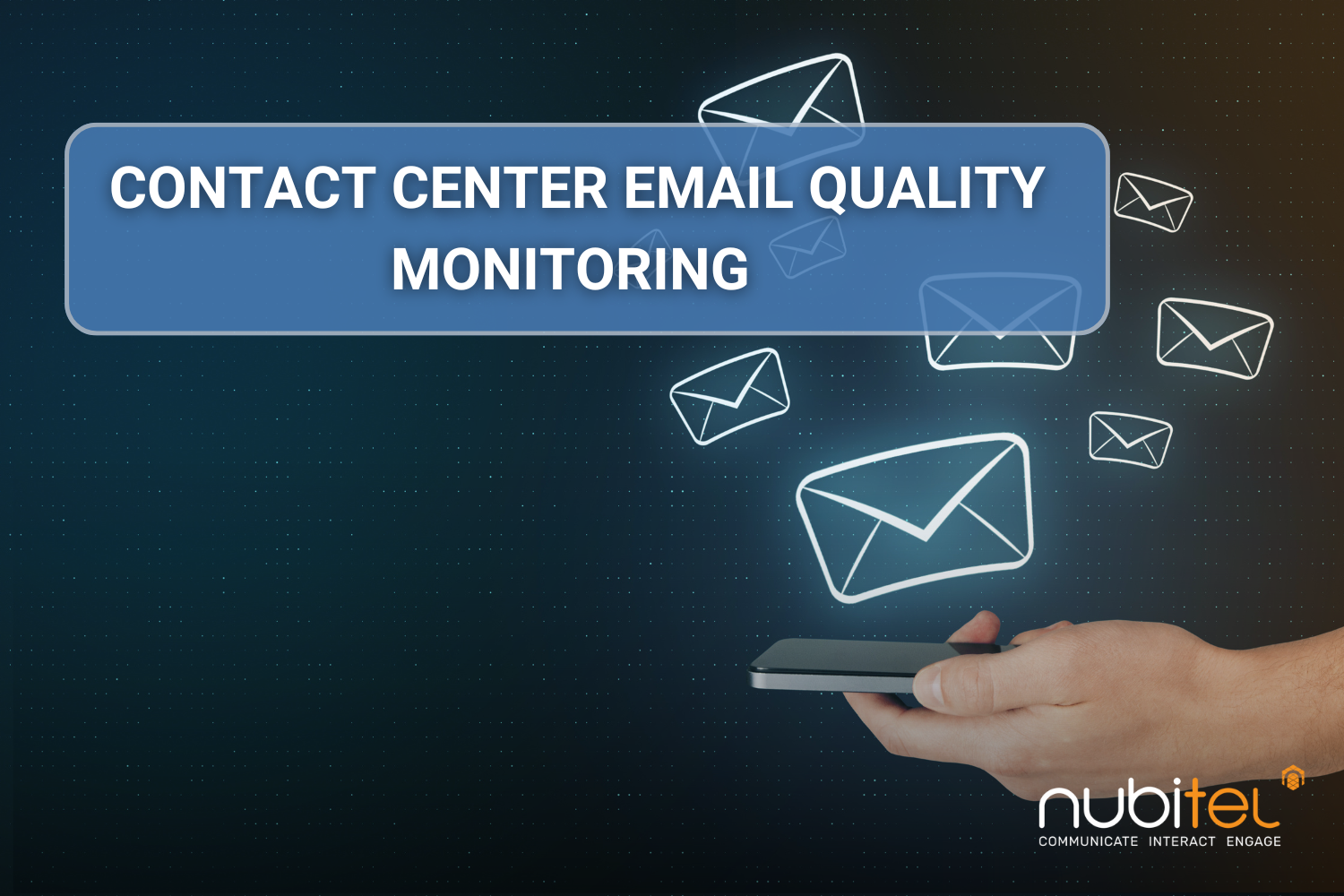Call center email quality monitoring is crucial in today’s fast-paced digital landscape, where email remains a primary mode of communication. In 2022, an estimated 333 billion emails were sent and received daily worldwide, with projections showing this number will soar to 392.5 billion by 2026. For call centers, this surge underscores the need for effective email quality monitoring to ensure accuracy, professionalism, and efficiency in every customer interaction.
This article highlights the critical role of email quality monitoring in call centers, emphasizing its impact on customer satisfaction, agent performance, and regulatory compliance, with practical strategies and tools to drive continuous improvement and success in competitive markets.
Table of Contents
ToggleImportance Of Call Center Email Quality Monitoring
Email quality monitoring helps ensure standardized customer communication within call centers. Research indicates that 43% of customers expect an email response within 24 hours, while 14% anticipate replies within 4 hours.
However, the average response time stands at 12 hours and 10 minutes, highlighting a gap between customer expectations and actual response times. Monitoring email interactions allows businesses to assess response quality and timeliness, ensuring alignment with service standards.
Effective email quality monitoring not only ensures adherence to brand standards but also reduces errors, minimizes misunderstandings, and supports regulatory compliance. In the competitive markets of Singapore and Malaysia, where customer expectations are high, adopting robust quality monitoring processes is key to staying ahead.
Key Metrics For Email Quality Monitoring
Let’s focus on another important question: How does email quality monitoring really benefit you?
When it comes to email communication, accuracy, response time, tone, and adherence to policies all play critical roles in ensuring a smooth customer experience. Let’s dive into each of these metrics.
Accuracy And Clarity
Accuracy and clarity are fundamental to email communication. Emails must provide precise and detailed answers to customer queries to prevent confusion and ensure customer satisfaction. For instance, when responding to a billing inquiry, the agent should clearly explain the charges and include relevant details, such as due dates or payment methods.
Evaluating emails for factual correctness and clear messaging helps identify patterns of errors and enables proactive improvements. This reduces the likelihood of follow-ups and improves the overall efficiency of customer support.
Response Time
Timely responses are critical in maintaining customer satisfaction. In today’s fast-paced environment, customers expect prompt resolutions to their issues. Monitoring response times allows managers to address bottlenecks, such as inadequate staffing or inefficient workflows, that may delay replies.
Tone And Professionalism
The tone and professionalism of email communication directly influence customer perceptions. Emails should convey empathy, respect, and a problem-solving attitude. An agent responding to a frustrated customer about a delivery delay might use a reassuring and apologetic tone, demonstrating understanding and a commitment to resolving the issue.
Regularly reviewing emails for tone and professionalism ensures consistent brand representation and fosters positive relationships with customers, especially in culturally diverse markets like Malaysia and Singapore.
Adherence To Policies
Adhering to company policies and industry regulations is crucial in email communication. Agents must follow guidelines related to data privacy, compliance, and escalation procedures. For example, an agent handling sensitive customer data should ensure the email adheres to PDPA (Personal Data Protection Act) regulations in Singapore.
Monitoring adherence minimizes compliance risks and ensures consistent service delivery, safeguarding the company’s reputation and legal standing.
Tools And Technologies For Effective Email Quality Monitoring
Technology can make this process much easier and more efficient. Let’s explore how automation and analytics software can enhance email management.
Automation Tools
Automation tools help streamline email monitoring by flagging issues, assigning priority levels, and generating real-time reports. Features such as automated sorting, escalation of flagged emails, tracking response times, and skills-tagged assignments ensure consistent and efficient handling of communications.
For instance, the Email Queue dashboard automatically highlights delayed responses or unresolved cases, enabling supervisors to take swift corrective action. These tools not only save time but also foster consistency, providing supervisors with actionable insights to address performance gaps effectively.
Analytics Software
Analytics software enables real-time monitoring of email interactions, providing visibility into key operational metrics. For example, real-time dashboards checking inbound email performance help supervisors track queue status, SLA compliance, response times, and agent availability, ensuring efficient email management.
These tools facilitate the identification of trends in email handling efficiency, such as response delays or high email backlog. By utilizing data-driven insights, supervisors can adjust workflows, allocate resources effectively, and maintain consistent service quality. Implementing analytics software supports structured email management, contributing to operational efficiency and improved customer service outcomes.
Best Practices For Call Center Email Quality Monitoring
Let’s break it down even further: How exactly does email quality monitoring benefit your call center? Here’s a closer look:
Regular Training And Feedback
Regular training and constructive feedback are essential for maintaining high email quality. Managers should review emails periodically and provide actionable insights to agents. For example, highlighting an agent’s strengths in clarity while addressing areas like tone fosters growth.
Incorporating role-playing exercises and e-learning modules tailored to specific issues ensures agents are well-prepared to handle diverse customer scenarios.
Standardized Quality Guidelines
Establishing standardized quality guidelines ensures consistency across all email communications. Guidelines should cover grammar, tone, response time, and adherence to policies. For instance, a unified style guide for agents can streamline communication and reduce discrepancies.
Regularly updating these guidelines to reflect evolving customer expectations and business needs helps maintain relevance and effectiveness.
Continuous Improvement Strategies
Continuous improvement strategies, such as leveraging customer feedback and monitoring performance metrics, drive long-term success. For example, analyzing customer satisfaction surveys can reveal insights into how email interactions impact overall experience.
Implementing changes based on these insights, such as refining email templates or enhancing agent training programs, ensures ongoing enhancement of email quality.
Benefits of Email Quality Monitoring in Call Centers
-
- Improved Customer Satisfaction
Effective email quality monitoring ensures that customers receive accurate, clear, and timely responses to their queries. By consistently meeting customer expectations in terms of communication quality, call centers can enhance overall satisfaction and foster loyalty. This leads to a positive customer experience, increasing the likelihood of repeat business and positive reviews.
- Improved Customer Satisfaction
-
- Reduced Customer Churn Rates
By identifying and addressing communication gaps or inconsistencies, email quality monitoring enables call centers to resolve issues more efficiently. This proactive approach helps to retain customers by resolving their concerns promptly, thereby reducing churn rates and improving long-term customer retention.
- Reduced Customer Churn Rates
-
- Enhanced Brand Reputation
Maintaining high standards of communication across email channels strengthens brand perception. By ensuring professionalism, tone consistency, and clear messaging, call centers contribute to a positive brand image, which helps build trust with customers. In highly competitive markets like Singapore and Malaysia, this reputation is critical to differentiation and customer loyalty.
- Enhanced Brand Reputation
-
- Faster and More Accurate Responses
Monitoring email quality helps identify recurring issues or inefficiencies in responses, enabling improvements in response time and accuracy. By ensuring that agents provide precise and helpful answers, call centers can increase operational efficiency and reduce the need for follow-up inquiries, thus enhancing customer satisfaction.
- Faster and More Accurate Responses
-
- Optimized Agent Performance
Regularly reviewing email interactions provides valuable insights into individual agent performance. By identifying areas for improvement, call centers can implement targeted training initiatives to boost agent skills and effectiveness. This continuous development leads to better performance, higher employee satisfaction, and lower turnover rates.
- Optimized Agent Performance
-
- Compliance with Industry Regulations
Email quality monitoring ensures that agents adhere to critical compliance guidelines and regulations, such as data privacy laws (e.g., PDPA in Singapore). By ensuring that communications meet legal and regulatory requirements, call centers can minimize the risk of non-compliance, which can lead to costly fines or legal issues.
- Compliance with Industry Regulations
-
- Operational Efficiency and Resource Allocation
By utilizing monitoring tools and analytics, call centers can pinpoint inefficiencies in workflows or communication processes. This data-driven approach enables better resource allocation, improved staffing decisions, and streamlined operations, which result in reduced operational costs and enhanced productivity.
- Operational Efficiency and Resource Allocation
-
- Stronger Customer Relationships and Loyalty
Consistent, high-quality email interactions help to build trust and rapport with customers, leading to stronger, long-term relationships. Monitoring ensures that agents respond with empathy and professionalism, which enhances customer perceptions and deepens brand loyalty. This ongoing positive interaction nurtures stronger relationships, increasing customer retention and lifetime value.
- Stronger Customer Relationships and Loyalty
Conclusion
Call center email quality monitoring is an indispensable practice for ensuring high standards of customer communication. By tracking key metrics, leveraging advanced tools, and implementing best practices, businesses can enhance customer satisfaction, improve agent performance, and achieve operational excellence. In today’s dynamic and demanding markets, prioritizing email quality monitoring is essential for building long-lasting customer relationships and driving business success.





